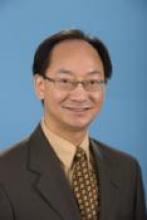
William C. Tang received his BS, MS, and Ph.D. in Electrical Engineering & Computer Sciences from the University of California at Berkeley in 1980, 1982, and 1990, respectively. His seminal thesis work and invention on the electrostatic comb drive has become a crucial building block for many microactuator and microsensor research in the field, and was, and continues to be recognized internationally as one of the most influential and foundational work. Since his graduation, he continued his contribution to the MEMS field first in the automotive industry as a Research Senior at Ford Research Laboratory in Dearborn, Michigan, and as the Sensor Research Manager at Ford Microelectronics, Inc., in Colorado Springs, Colorado. In 1996, he joined the Jet Propulsion Laboratory, California Institute of Technology, where he was the Supervisor of the MEMS Technology Group, leading the pursuit of MEMS technology for space applications.
In July 1999, he assumed the responsibilities as a Program Manager at the Defense Advanced Research Projects Agency (DARPA). He managed the programs in Micro-Electro-Mechanical Systems (MEMS), Micro Power Generation (MPG), Nano Mechanical Array Signal Processors (NMASP), and Chip-Scale Atomic Clock (CSAC) with an annual budget exceeding $60 million. Through his role as the Program Manager for the largest program within the Microsystem Technology Office (MTO) and the single largest government-funding source for United States MEMS research, Dr. Tang provided national- and international-level leadership in shaping the future of MEMS. He provided programmatic guidance and technical supervision for 90+ contracts and grants across the United States, coordinating the seven thrust areas within the MEMS program in a complementary way to solve difficult technical problems.
Dr. Tang interacted with other government agencies including the National Science Foundation (NSF), the National Institute of Standard and Technology (NIST), and the National Aeronautics and Space Administration (NASA) to promote and coordinate government investment in MEMS. He also provided leadership in collaboration between the MEMS research community and various branches within the military to transition research results to the end users. As a direct result of his effort, the Navy, the Army, and the Air Force initiated their funding efforts to further develop several important projects from the DARPA MEMS program into military platforms. Furthermore, many of the successful MEMS projects under his supervision also transitioned to product development within commercial volume manufacturers.
Dr. Tang was frequently invited to give keynote addresses both nationally and around the world to provide assessment of the state of MEMS research and his vision for the future direction and impact of MEMS. Internationally, he represented the United States as the authority on MEMS and contributed to global coordination on MEMS activities, which included the World Micromachine Summit, the NATO Research and Technology Organization MEMS Task Group, US-Europe Coordination and Roadmapping for MEMS, the International Technology Research Institute’s study on Japanese MEMS industry, Canada-Europe Forum on MEMS for Aerospace Applications, the International Future Trends in Microelectronics Advanced Workshop, the Workshop on Frontiers in Electronics 2002, the First International Conference on Nanoscale/Molecular Mechanics, the first IEEE International Conference on Sensors and the International Conference on Micro and Nano Systems 2002.





